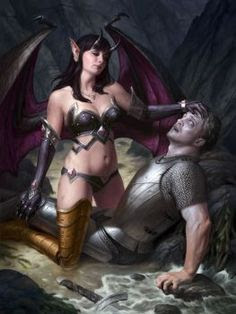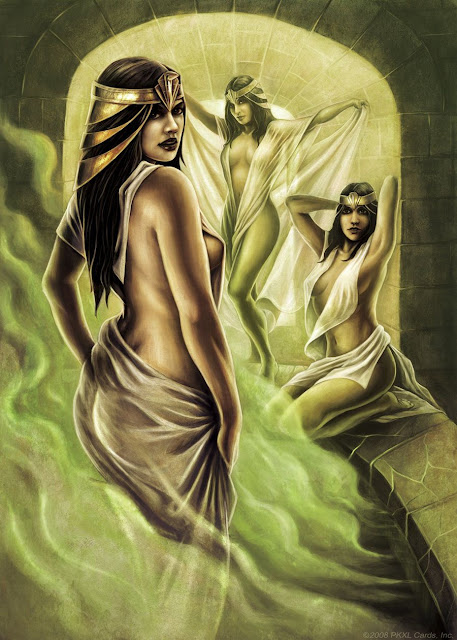THE filthy demons called Empusae, children of Hecate, are ass-haunched and wear brazen slippers-unless, as some declare, each has one ass’s leg and one brazen leg. Their habit is to frighten travellers, but they may be routed by insulting words, at the sound of which they flee shrieking. Empusae disguise themselves in the forms of bitches, cows, or beautiful maidens and, in the latter shape, they lie with men by night, or at the time of midday sleep, sucking their vital forces until they die.
1. The Empusae (‘forcers-in’) are greedily seductive female demons-a concept probably brought to Greece from Palestine, where they were known by the name of Lilim (‘children of Lilith’) and were thought to be haunched, the ass symbolizing lechery and cruelty. Lilith (‘scritch-owl) was a Canaanite Hecate, and the Jews made amulets to protect themselves against her as late as the Middle Ages. Hecate, the real ruler of Tartarus, wore a brazen sandal-the golden sandal was Aphrodite’s-and her daughters, the Empusae, followed this example. They could change themselves into beautiful maidens or cows, as well as bitches, because the Bitch Hecate, being a member of the Moon-triad was the same goddess as Aphrodite, or cow-eyed Hera.
SISYPHUS, son of Aeolus, married Atlas ’s daughter Merope, the Pleiad, who bore him Glaucus , Ornytion , and Sinon, and owned a fine herd of cattle on the Isthmus of Corinth. b. Near him lived Autolycus , son of Chione , whose twin-brother Philammon was begotten by Apollo , though Autolycus himself claimed Hermes as his father. c. Now, Autolycus was a past master in theft, Hermes having given him the power of metamorphosing whatever beasts he stole, from horned to unhorned, or from black to white, and contrariwise. Thus although Sisyphus noticed that his own herds grew steadily smaller while those of Autolycus increased, he was unable at first to accuse him of theft; and therefore, one day, engraved the inside of all his cattle’s hooves with the monogram SS or, some say, with the words ‘Stolen by Autolycus’. That night Autolycus helped himself as usually and at dawn hoof-prints along the road provided Sisyphus with sufficient evidence to summon neighbours in witness of the th...


Comments
Post a Comment